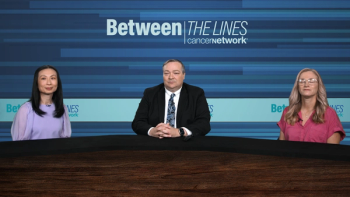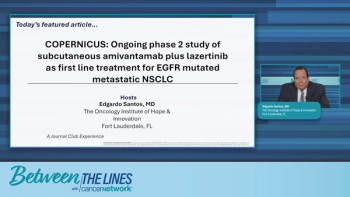
Panelists discuss how toxicity monitoring and quality-of-life considerations must be adapted as potent therapies move into earlier-line and curative-intent settings.

Your AI-Trained Oncology Knowledge Connection!


Panelists discuss how toxicity monitoring and quality-of-life considerations must be adapted as potent therapies move into earlier-line and curative-intent settings.

This segment focuses on practical strategies for managing high-risk CML, particularly in patients with proliferative and cytopenic symptoms. The discussion begins with balancing symptomatic management, such as fatigue, early satiety, splenomegaly, anemia, and thrombocytopenia, alongside disease-directed therapy.

Explore the complexities of managing stage 3 gastric adenocarcinoma, including neoadjuvant therapy and nutritional strategies for optimal patient outcomes.

Explore the evolving landscape of smoldering myeloma treatment, focusing on fixed-duration therapy and patient-provider communication strategies.

Panelists discuss how clinicians distinguish candidates for second-line versus third-line CAR T by weighing disease aggressiveness, relapse timing, cytogenetic risk, patient preferences, and toxicity tradeoffs.

Panelists discuss how differences in BCMA-directed CAR T constructs (including binding configuration and expansion kinetics) can influence toxicity timing, monitoring needs, and real-world product selection.

Soumen Das, MBBS, MS, FACS, discussed the BC-RADS-2 study and its potential to transform early breast cancer detection in low- and middle-income countries.

Clinical Scenario A: 77-year-old male with newly diagnosed LR-MDS

Experts debate the optimal dose escalation strategy for Luspatercept in treating low-risk MDS, emphasizing patient-centric approaches and long-term outcomes.


Experts discuss the benefits of combination therapies for non-small cell lung cancer, emphasizing improved survival rates and patient quality of life.


Explore the latest insights on combination therapies for metastatic cancer, focusing on long-term management and patient outcomes in challenging cases.

Caroline Chung, MD, MSc, FRCPC, CIP, explores how AI in diagnostic imaging may help with accelerating scan acquisition and extracting subvisual features.

Caroline Chung, MD, MSc, FRCPC, CIP, discussed how AI is transforming radiotherapy, ranging from uniform dosing to personalized, immune-sparing strategies.

Discover how Copernicus enhances patient care with innovative treatments and supportive practices for advanced EGFR mutation cases.

Discover how specialized cancer care, including nurse navigators and telehealth, enhances patient outcomes and quality of life post-treatment.

Here, the panel turns to one of the most debated questions surrounding bispecific antibodies: how long should patients remain on therapy? Jagannath raises a scenario involving a patient who achieves MRD-negative complete remission after 1 and 2 years of therapy, prompting discussion about whether to continue, taper, or discontinue treatment.

Panelists discuss how identifying high-risk subgroups enables more precise selection of maintenance therapies that maximize progression-free survival while accounting for biomarker differences.

Explore the latest findings on smoldering myeloma treatments, including lenalidomide's effectiveness and the importance of patient monitoring in clinical trials.

The panel discusses the case of a 67-year-old female patient diagnosed with high-risk chronic myelomonocytic leukemia (CML-1) who presents with intermediate risk scores and abnormal blood counts, including elevated white blood cells, mild thrombocytopenia, and anemia.

This segment tackles one of the most nuanced decisions in modern myeloma treatment: determining when to use BCMA CAR T-cell therapy versus a BCMA bispecific antibody.

Panelists discuss how emerging neoadjuvant and adjuvant data in HER2-positive breast cancer are challenging traditional standards and supporting earlier use of highly effective agents.

This segment continues the discussion of high-risk MDS management, focusing on how clinicians define failure of HMAs and determine next steps in therapy, particularly in patients with TP53 mutations.

Daratumumab shows promise in managing smoldering myeloma, balancing infection risks and adverse effects while offering a preferable alternative to lenalidomide.

Experts discuss the management of immune-mediated side effects in perioperative cancer treatment, emphasizing patient care and monitoring strategies.

Ongoing studies are evaluating teclistamab-based regimens in the frontline setting as well as smoldering multiple myeloma, according to Surbhi Sidana, MD.

A potential FDA approval of teclistamab/daratumumab would offer a “highly effective” option in multiple myeloma.

Experts debate the efficacy of luspatercept versus erythropoietin in treating low-risk MDS, emphasizing individualized patient care and emerging therapies.

Experts debate the optimal timing for initiating treatment in low-risk MDS, emphasizing early intervention to enhance patient quality of life.